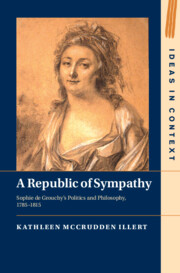Book contents
- A Republic of Sympathy
- Ideas In Context
- A Republic of Sympathy
- Copyright page
- Dedication
- Contents
- Acknowledgements
- Abbreviations
- Introduction
- Chapter 1 The Letters, 1786
- Chapter 2 The Wheel, 1785–1789
- Chapter 3 The Revolution, 1789–1793
- Chapter 4 The Republic, 1791–1793
- Chapter 5 The Publication, 1794–1799
- Chapter 6 The Mask, 1799–1804
- Chapter 7 The Poet, 1804–1810
- Chapter 8 The Thread, 1798–1815
- Conclusion
- Appendix: Attributions
- Bibliography
- Index
Chapter 4 - The Republic, 1791–1793
Published online by Cambridge University Press: 18 December 2024
- A Republic of Sympathy
- Ideas In Context
- A Republic of Sympathy
- Copyright page
- Dedication
- Contents
- Acknowledgements
- Abbreviations
- Introduction
- Chapter 1 The Letters, 1786
- Chapter 2 The Wheel, 1785–1789
- Chapter 3 The Revolution, 1789–1793
- Chapter 4 The Republic, 1791–1793
- Chapter 5 The Publication, 1794–1799
- Chapter 6 The Mask, 1799–1804
- Chapter 7 The Poet, 1804–1810
- Chapter 8 The Thread, 1798–1815
- Conclusion
- Appendix: Attributions
- Bibliography
- Index
Summary
Chapter 4 explores Grouchy’s first elaboration of a specifically republican political philosophy during the French Revolution. It describes how, together with Condorcet, Paine, Brissot and others, she founded the first explicitly republican journal of the Revolution in 1791: Le Républicain. It explores the context for her declaration of republicanism: the flight of Louis XVI from Paris in June 1791. It demonstrates how, in the articles she contributed to this journal and other anonymously published pieces, Grouchy elaborated on the theory she had been developing between 1786 and 1791. She added an unambiguously anti-royal element to her thought, arguing that a king can never feel sympathy with his people, and can therefore never be a just ruler. This Chapter explores how she drew, in particular, on the ideas of Paine, but also describes a major intellectual and political fissure that developed between Grouchy and her ‘Brissotin’ allies during this period. While they advocated an offensive European war after 1791, she argued against one. Due to her reliance on mutual sentiment between ruler and ruled as the basis of political society, she opposed, on philosophical grounds, the sending of ‘armed missionaries’.
Keywords
- Type
- Chapter
- Information
- A Republic of SympathySophie de Grouchy's Politics and Philosophy, 1785–1815, pp. 98 - 120Publisher: Cambridge University PressPrint publication year: 2024

